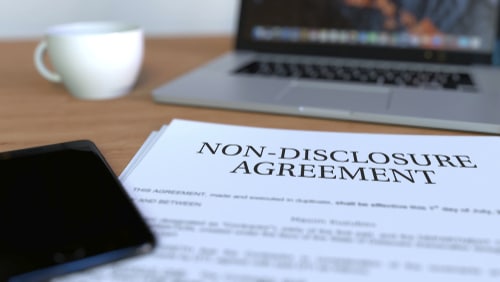
A non-disclosure agreement can also be known as a ‘’gagging order” or “hush agreement”. Non Disclosure Agreements are a contract, or a part of a contract between two parties. These contracts are designed to prevent parties, which can include employees, or ex-employees, from making confidential information public. These can be termed as confidentiality clauses, in legal terminology but are commonly known as Non Disclosure Agreements or NDAs.
Whilst Non Disclosure Agreements often apply to information that is commercially sensitive like details of an invention, a secret recipe or idea or information that could damage reputation or market standing of an organisation. They are also often used to prevent an ex-employee from discussing allegations of wrongdoing in the workplace to the media once a settlement has been agreed upon. These are signed when organisation and an employee are trying to solve a dispute; such as, a claim for wrongful dismissal without going through a legal hearing. These can also be signed earlier, such as, at the time of recruitment.
What do they cover?
It is important to understand that NDAs do not stop employees from reporting a misbehaviour or an alleged act which can be deemed illegal. In case a manager or an employee faces allegations of an attempted fraud or rape, reporting these to police will still be a mandate and not illegal. But an allegation of a boss trying to make sexual comments or bullying a member of staff may at times be covered. If bullying however leads to a protected characteristic like age, sex, race, ethnicity or sexual orientation, it will be deemed as discrimination and hence considered illegal. The length of a non disclosure agreement varies with situation as well as the organisation and purpose of NDA.
How many NDA are there?
Research suggests that a third of UK workers have signed an NDA at some point or the other during the tenure of their service. It is almost impossible to give a count of how many are there. Most settlement agreement contain an NDA that prevents the employees from speaking about matters such as harassment or discrimination once the terms of settlement are fulfilled.
How are these NDA enforced?
In case of breach of NDA, the signer can be sued for breaking a contract. In case a company thinks that a NDA will be breached, it can apply for an injunction. If someone tries to breach an injunction, the same will be considered as a criminal offence and hence can lead to a fine or jail to the one found guilty.
Can injunctions be overcome?
In some cases, yes. The government has certain privileges also known as Parliamentary Privileges that guarantee a person free speech. This privilege is only meant for parliamentarians like MPs and their peers to mention them in the House of Commons and House of Lords.
For example, Former Labour Cabinet Minister, Lord Hain exercised his parliamentary privileges in October 2018 to name Sir Philip Green, a businessman accused for sexual and racial harassment by Daily Telegraph after the newspaper was bound by an injunction for doing this.
If you are not an MP with Parliamentary Privileges and would like more information on NDAs our no win no fee Employment Solicitors can assist with all types of claims. Naturally, we pride ourselves on providing the best possible service to the highest standards, we offer employment law advice on all problems. Call us on 020 3835 3940

